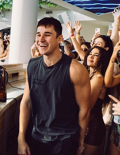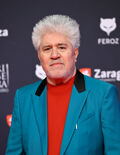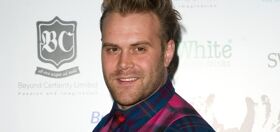
The 50th anniversary of the first pride looks a whole lot different than anyone could have predicted. First when the COVID-19 pandemic led to a domino effect of cancelations as the need for public health measures became a necessary tool in combatting the virus, then when the LGBTQ community stood in solidarity in protests sparked by the death of George Floyd.
The Black Lives Matter movement has not and will not lose steam until real action is taken to address America’s continued history of racism and violence against African Americans, and now pride organizations are organizing peaceful, safety-focused marches in place of parades and parties.
As a new generation of young, queer people become engaged in anti-racist activism, there’s never been a better time to spotlight these six Black, queer trailblazers who are committed to reshaping the world for the better.
1. Phill Wilson

When the AIDS epidemic was rapidly gaining momentum in the early ’80s, Phill Wilson’s career in activism sprang into action. He and his partner, Chris Brownlie, were both diagnosed with HIV, and Wilson observed a major deficit in outreach to African Americans. Wilson carved out a career in HIV/AIDS community work, serving simultaneously as Director of Policy and Planning for the AIDS Project in Los Angeles and AIDS Coordinator for Los Angles in the mid-’90s.
Though his own health at times has forced him to step back from his work, Wilson’s determination propelled him to continue fighting for his community — a trait we could all learn from in today’s rocky climate. In 1999 he founded the Black AIDS Institute, the “only premier uniquely and unapologetically Black think tank and do tank in America powered by two decades of work to end the Black HIV epidemic.”
The following year he was appointed to President Obama’s Advisory Council on HIV/AIDS.
Asked what inspired him to found the Black AIDS Institute, Wilson told the Windy City Times:
I began to look around and kind of ask myself: Okay, so what’s going on? It felt like no one was mobilizing the larger Black community. There were organizations that were trying to do prevention work, and there were organizations with Ryan White funding (a federally funded program for people living with HIV/AIDS) trying to do treatment and clinics. But there really was no one, in my opinion, that was taking on the larger Black community with HIV and AIDS. I felt like we had to break away from the concept of AIDS as a ‘gay disease’, and expand it so it was important to the entire Black community.
2. Andrea Jenkins

Black trans women face unique hardships in every facet of life and continue to experience violence and murder at an appalling rate. Representation remains not just about acceptance–it’s a matter of life and death. That reality makes Andrea Jenkins achievement as the first Black, openly transgender woman elected to office in the United States all the more significant. And she won with over 70% of the vote.
But even prior to Jenkins’ historic 2018 Minneapolis City Council campaign victory, she worked to elevate the transgender community. Notably, she founded the Trans United Fund with Hayden Mora, a political action committee devoted to helping other trans candidates run for office.
Active in the Trans Lives Matter movement, Jenkins, who is also a writer and poet, has continued to embody leadership in the aftermath of George Floyd’s murder, which happened in her own town. As the nation has focused its attention on the injustices plaguing Black America, Jenkins has worked on legislation to rein in racial profiling and police violence. And her voice is more powerful than ever.
After singing “Amazing Grace” at a press conference for Floyd, she told the crowd:
We feel as if there was a knee on all of our collective necks — a knee that says Black life does not matter. I am a part of this system to help to take that knee off of our necks. And that is the work that I will be doing.
3. Barbara Smith

If you think the term “intersectionality”–the combination of identities in a single person–is a newfangled term, think again. In fact, it may as well have been invented by the great Barbara Smith. In 1974, she was among the founders of Boston’s Combahee River Collective, a political group that organized around how the overlapping combination of sexual, racial, gender, and economic identities was often used against Black women of color in varying degrees and at the same time.
After the collective disbanded in 1980 and inspired by Alice Walker, Smith realized that the next step was to project this vision into the world in a positive fashion through literature and creative non-fiction. She formed Kitchen Table: Women of Color Press which quickly established a platform for the great writers of the day who wrote through the lens of intersectionality. Among the literary lights she published before the press shuttered were Audre Lorde, Cherríe Moraga, Hattie Gossett, Susan L. Yung, June Jordan, and Gloria Anzaldúa.
After flourishing in organizing, publishing, and then academia, Smith broke through to mainstream politics, elected for two terms to the Albany, New York Common Council where she continued her fierce equality advocacy but on a street level.
Predating the Black Lives Matter movement by decades, today she still sounds like a central part of its demands for racial and economic justice:
Unless we eradicate the systemic oppressions that undermine the lives of the majority of L.G.B.T.Q. people, we will never achieve queer liberation.
4. Shea Couleé

Jaren Merrell has captivated drag fans as Shea Couleé, first as a finalist on season nine of RuPaul’s Drag Race and now riding a new wave of momentum on season five of All Stars. But the Chicago-based queen is much more than a pretty face (and let’s be real a standout triple-threat talent). Couleé has long emphasized the importance of using their platform to inspire and uplift queer people of color to feel confident in their identities and hasn’t shied away from addressing racism in the drag community and the world at large.
With the All Stars spotlight coinciding with a renewed wave of Black Lives Matter activism, they have doubled down on that responsibility with aplomb.
That started with speaking candidly to fans about their conflicting feelings as All Stars premiered in the wake of COVID-19 and the national outrage sparked by George Floyd’s murder at the hands of Minneapolis police. In an Instagram post, Couleé wrote:
I have struggled…with the desire to share and celebrate my return to All Stars, and a sense of guilt in feeling that would be too self serving during these incredibly sensitive times. I with I had a proper answer, but I am still learning. In this moment however, I do feel that sharing successful black stories is an important tool in creating hope for the younger Queer POC who watch the show looking for inspiration.
And while their story is certainly an inspiration, Couleé has emphasized how vital it is for QPOC to seize this moment of change. In addition to leveraging social media to raise awareness of the injustices afflicting Black Americans, they gave a particularly powerful speech at the Chicago Drag March for Change protest earlier this month in support of BLM, telling the crowd:
We are Black, we are queer and we deserve to take up space…My value shouldn’t be wrapped up in my talent. My value should not be wrapped up in Instagram followers. My value should be strictly based on the fact that I’m a human being walking this earth right next to you…You want to show up? Y’all need to hire Black people in your bars. And I’m not just talking about to wipe up your drinks, I’m talking about I want to see Black managers. I want to see Black people decide who gets to come in and who gets to make the money. And while we’re at it, we need to get a f*cking Black-owned bar up in this b*tch…My name is Shea Couleé and I didn’t come to play; I came to dismantle white supremacy.
How about we take this to the next level?
Our newsletter is like a refreshing cocktail (or mocktail) of LGBTQ+ entertainment and pop culture, served up with a side of eye-candy.
5. Mark Bradford

Mark Bradford knows the power of art and imagery. The acclaimed abstract artist’s work at first glance may seem purely interested in aesthetics, but just like the varied materials and textures he uses, there are emotional and visceral layers to his art. Much of his work focuses on aerial-type assemblages, often depicting his hometown of Los Angeles, taking a bird’s eye view of the suffering felt by the African American communities on the streets below. And right now, in Los Angeles and in cities across the country, those struggles are getting more of the attention they deserve.
With the media so often missing the forest for the trees, Bradford’s massive pieces give the viewer a chance to absorb the vastness of racial inequality. The pain is painted into the places he depicts, inseparable from the land beneath the city streets. It’s a vitally important lesson for those still struggling to grasp the context of racism in America.
Take, for instance, his 2006 piece, Scorched Earth, which represents Tulsa, Oklahoma as a place that can never get out from underneath the racist massacre carried out in 1921 by white residents against the city’s thriving Black community:

While everyone must keep their eyes open to the daily events of protest and stay vigilant in demanding change, we’re lucky there are artists like Bradford weaving the past and present together, reminding us why the stakes are so high.
6. Patrisse Cullors

As a teenager, Patrisse Cullors already realized her power to make an impact. Despite being forced out of her home at 16 when she came out to her family as queer, Cullors became active in the Bus Riders Union, a grassroots organization focused on changing the policies of public transportation authorities that it views as racial discrimination.
And the UCLA grad’s streak in community organizing was far from over.
Following the 2013 acquittal of George Zimmerman, a white man who fatally shot Trayvon Martin, a Black, unarmed teenager, Cullors founded Black Lives Matter along with friends and fellow activists Alicia Garza and Opal Tometi. What started as a social media hashtag grew to inspire a national community outraged over Martin’s senseless death, Zimmerman’s freedom and the systemic racism that allows for it and countless events like it to go unchecked.
The movement grew to include more than 30 local chapters and remained active through the 2016 presidential election. It’s made global headlines and gained even stronger momentum this year during the protests of George Floyd’s death by Minneapolis police officer Derek Chauvin.
Cullors has remained a vocal advocate for change, focusing her sights on the abuse of inmates at the hands of prison guards and restructuring the nation’s law enforcement system.
Speaking recently to the Chicago Tribune, Cullors said:
Law enforcement should not be the first responder for mental-health crises, they shouldn’t be the first responders for drug and alcohol abuse; there are a significant number of public health crises that law enforcement are forced to be the first responders to but should not be, and we could actually reallocate those dollars and give them back to the community. I’m talking about renegotiation of where we prioritize our money. Right now it’s mostly prisons and police, and we want to reallocate those dollars and put them into the community.

























Cam
Let me guess, the same trolls that come on here screaming about how accomplished Melania Trump is, will put up posts claiming that none of these people have really done anything.
Glad we have all of them, and thank you for all you do!
Neoprene
Mother Superior – You’re constant preemptive posts shows two things: That you have no life and you’re a bigot.
Kangol2
They’re all fighting racism but all also are important figures in their chosen professions and out and proud as LGBTQ people. Barbara Smith is a Black feminist activist and publisher; Phill Wilson has been fighting the AIDS pandemic, particularly among Black communities, for 30+ years; Mark Bradford is one of today’s major artists; etc. So I don’t disagree with the headline but it is almost a little reductive.